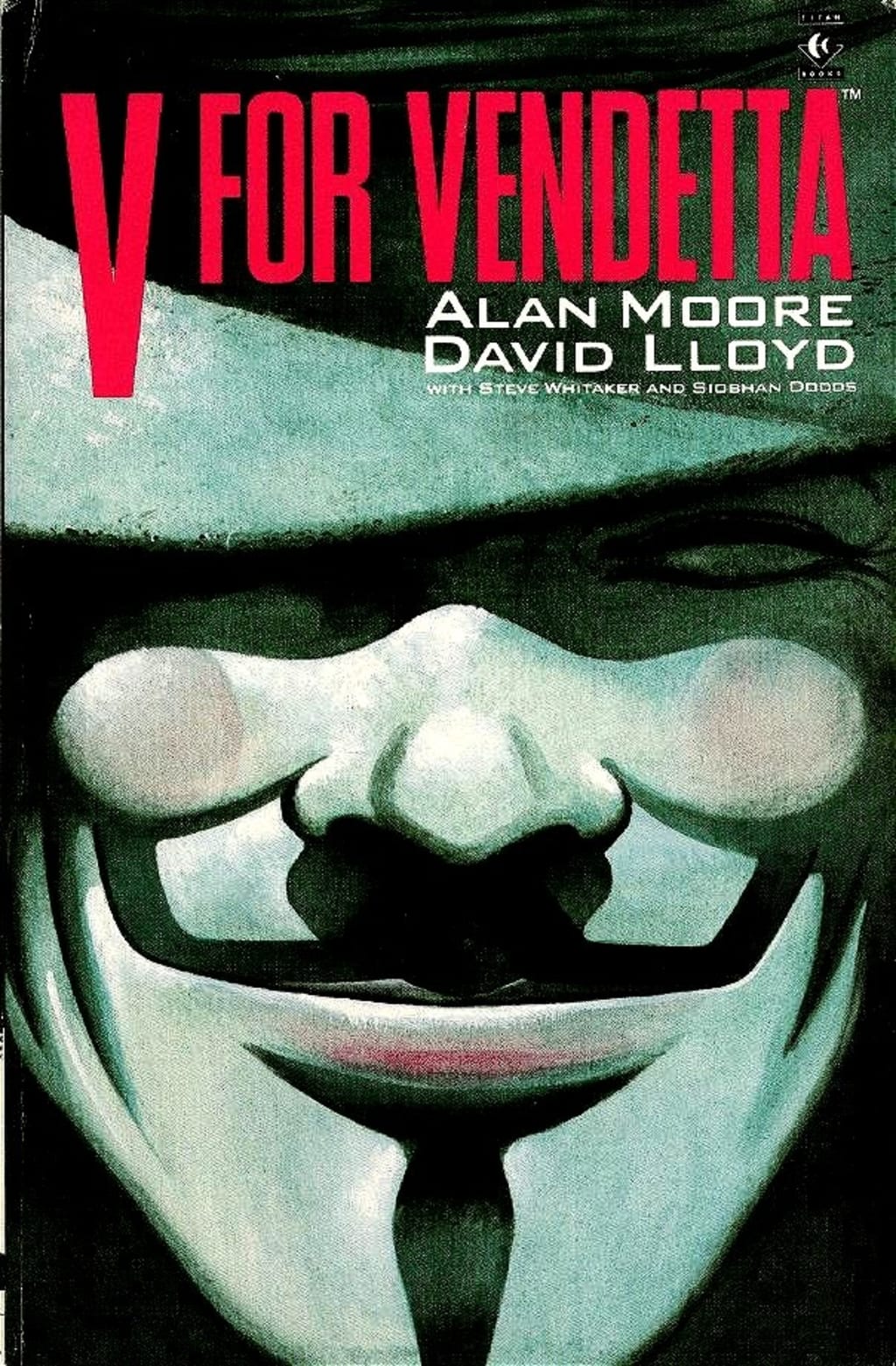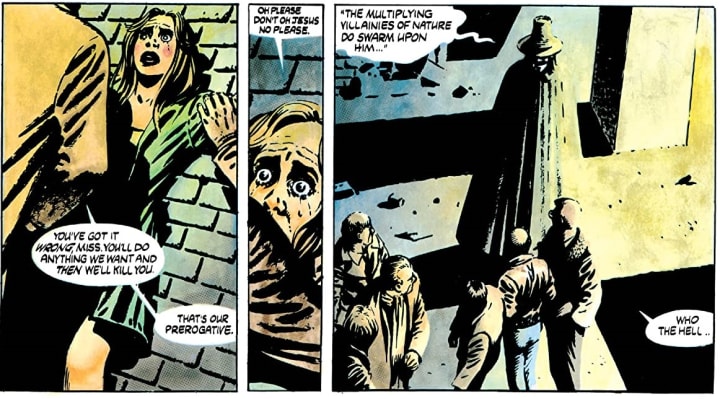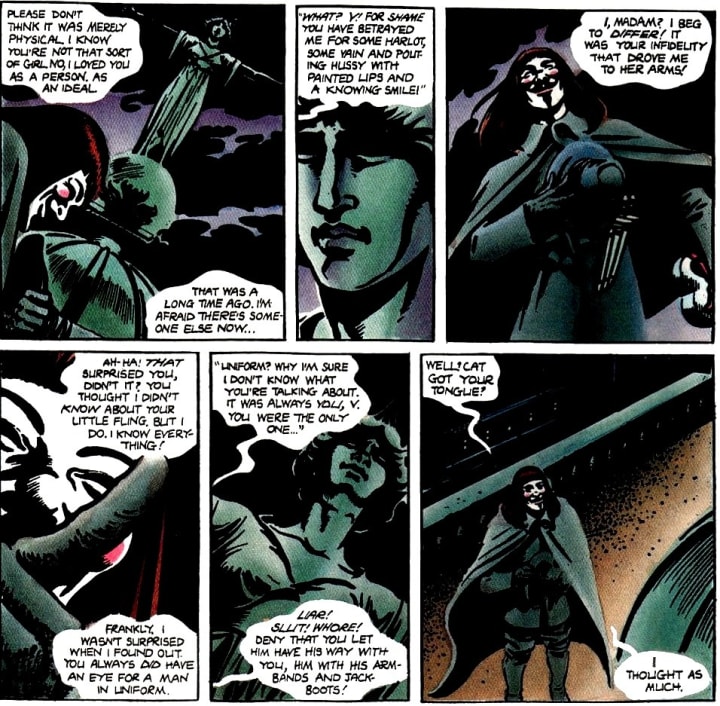
"The State sanctifies its own violence as law. Yours it calls crime." Max Stirner
I've quoted the above little observation by proto-anarchist and egoist Max Stirner, author of The Ego and What it Possesses, many, many times; perhaps too often, but there is no other way I could think to introduce an essay on Alan Moore's V for Vendetta, the most important graphic novel ever penned, a book so transcendent in its scope, so vast in its vision of humanity (both dark and light), it has become a piece of cultural iconography. The Guy Fawkes Face Mask is now an endemic, ubiquitous symbol of covert rebellion. Adopted by the Anonymous hacker group, it has gone the rounds of the internet and the face of the globe, a way for the most radical and dedicated and subversive elements of cultural fuckery to disguise themselves, as well as meld into one single "hive mind"; a collective unit pushing against repression and corruption; or, alternately, pushing the world forward past the edge of the envelope of nihilistic rebellion. V for Vendetta, more than any other single comic book creation I can think of (outside of Superman and Batman) has transcended the realm of mere entertainment into having a permanent place in the cultural zeitgeist.
The story is actually quite simple, a take-off from Phantom of the Opera. In a fascist future England, one controlled by a mentally unhinged leader (who, by the way, is in love with an all-powerful sentient AI computer called FATE), a terrorist called V, a masked anarchist with the pale, ever-smiling face of martyred English rebel Guy Fawkes, rescues Evey from the clutches of a sexually sadistic gang of "Finger Men": i.e. corrupt cops who prey on such women, but whose chief aim is the rooting out of political dissidents.

Saving Evey, V spirits her away to an underground lair out of Dr. Phibes, a place whose walls seemed to be lined with old movie posters, hearkening back to a past before the atomic war and fascist revolution that put "The Leader," Adam Susan, in power. Here, the eccentric V holds court like something from a gothic melodrama, quoting poetry and fanciful literature, playing music, and romancing his new uncertain paramour in the way men did back before the onset of the cultural dystopia. It is his own private world, his paradise of darkness and age, and the hidden. Slowly, he reveals his plot for revenge.
He has hitherto commenced a series of bombings, one of them accompanied by Tchaikovsky's "1812 Overture", and hence, the fascist U.K. government is desperate to catch him. The various agencies (represented by designations such as "the Eye," which is responsible for visual surveillance; "the Ear," audio surveillance; "the Nose," which is criminal investigation; and "the Mouth", which is the propaganda apparatus) find themselves in a mad scramble, but V is always ahead of the game. With the help of Evey, he tracks down and assassinates such people as Prothero, a radio propaganda hack, and Delia, a doctor who presided over a concentration camp that V escaped from by blowing up. He later executes a pedophile priest, and it is here that Evey protests she will no longer aid him if he is going to casually kill.
And it is here that V for Vendetta crosses the line from being a mere superhero fantasy of a very dark, modern, dystopian nature, to a truly morally ambiguous piece of literature. V, you see, is not a "good guy." In fact, any thinking being in the world already knows that "Good Guys" and "Bad Guys" exist only in the pages of comic books. There are no men wearing "black and white hats" to let us know when to clap or jeer, boo and hiss. There are simply infinite shades of grey.
In other words, good or bad, it's the one HOLDING THE DAMN GUN who gives the orders. Cynical yes, but I would argue that it's the one supreme truth of existence.
Kicked out of V's lair, Evey takes up with a man the security forces accuse her of plotting the murder of (or of another man; I was never quite clear on this point). She is arrested and sent to a detainment facility, where she is starved, and tortured, her head is shaved, and she takes on the mien of a concentration camp victim, expecting to be "taken out back of the chemical sheds, and shot."
She is passed a note through the cell ceiling written on a roll of toilet paper, detailing the legal ordeal of the writer as a lesbian, and why she is also in the State's prison for undesirables, being starved, tortured, and earmarked for execution. The kicker? At the end of it, she discovers that, amazingly enough, she has NOT been in prison. In fact, her entire ordeal was a charade, stage-managed by V, to psychologically break her resistance to his violent methods; to cleanse her of any bourgeois values holding her back from jumping off the precipice of her previous programming into the chasm of ANARCHY.
V describes anarchy thusly:
"Anarchy wears two faces, both creator and destroyer. Thus destroyers topple empires; make a canvas of clean rubble where creators can then build a better world."
V explains that anarchy does not mean chaos, but simply "without leaders." V sees the potential in human corruption as always rendering the State as a vehicle of oppression. He has not, he laments in the stage of the book wherein the "official organs" (as the Soviets called them) of propaganda have been silenced, delivered the rioting masses to the "Land of Do-As-You-Please", but instead to the "Land of Take What You Want." He conducts Evey to the roof of a building in a rainstorm, wherein, lifting her arms above her head in a weird gesture of submission, we realize that, though she may be "free" finally of bourgeois restraint and moral hang-ups, she is, in a sense, now strictly the captive of V. V has created an acolyte, an apostle of anarchism, and Evey, upon his death, will become his substitute.
Anarchism is, of course, as V so rightly describes, NOT a philosophy of chaos; although, most assuredly, the battle to get to a society where hierarchy, class distinction, and political and violent coercion by the State is abolished, is a long and arduous affair, sure to BE violent to those who wish to so engage the Beast, the System, in the only terms it recognizes. The world post-Pandemic (it is interesting to note that, though in the original graphic novel, the world has seen a nuclear war, in the film version of V for Vendetta, it is a PANDEMIC circa the year TWENTY-TWENTY that leads to a fascist political revolution) has become increasingly harsh, rigid, doctrinaire; social coercion and reprogramming is at an all-time high. "Canceling" impure and politically unorthodox thought and speech is at a staggering level, and surveillance and propaganda take up the slack of social control. We are a cowed, sheep-like, easily lied-to, and suppressed populace of soul-benumbed consumers, and it is to this future, this posterity, that Alan Moore was speaking in 1988. Speaking prophetically, I might add.

But it is still a world of moral ambiguities, wherein there ARE NO HEROES. There are simply those who struggle and those who cower and quake. But the image of V may burn in the heart of the reader, an image of the potentiality of vengeance, of vendetta, of revenge, of the "Land of Do-As-You-Please." Because, in the end, that's all there is.
Give the bastards what-for.
Love and napalm.
"Roses are red / Violets are blue / Everything's possible / Nothing is true."Alan Moore, "V for Vendetta" (1988)
"THE PIONEERS OF A WARLESS WORLD ARE THE YOUTHS WHO REFUSE MILITARY SERVICE." Albert Einstein
V for Vendetta - What Is Anarchism? | Renegade Cut
About the Creator
Tom Baker
Author of Haunted Indianapolis, Indiana Ghost Folklore, Midwest Maniacs, Midwest UFOs and Beyond, Scary Urban Legends, 50 Famous Fables and Folk Tales, and Notorious Crimes of the Upper Midwest.: http://tombakerbooks.weebly.com







Comments (7)
Excellent review. Authentic, timely, insightful, easy to read. Love it.
Great take on a excellent graphic novel
I loved the story very Good
One Max there (in the incipit) anticipating another: Weber. Well written.
✍️ "The State sanctifies its own violence as law. Yours it calls crime." Max Stirner... This was just the beginning of a brilliant essay. Posters for V FOR VENDETTA and PHANTOM OF THE OPERA seem ubiquitous to me. Still, I have never read or seen either. I just put both on my to-experience list. Your analysis is timely and these works illuminate timeless themes. You will be one of the reasons I am glad I opened Vocal this morning. 💙👏💙
I'm still a fan. And I saw a group of kids with the masks last night in my hometown. There is hope yet...
Excellent discussion of the subject. By this definition, I guess Jesus was a pacifist anarchist.